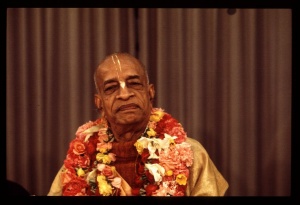CC Antya 11.24 (1975)

A.C. Bhaktivedanta Swami Prabhupada
Below is the 1996 edition text, ready to be substituted with the 1975 one using the compile form.
TEXT 24
- prabhu kahe,—“vṛddha ha-ilā ‘saṅkhyā’ alpa kara
- siddha-deha tumi, sādhane āgraha kene kara?
SYNONYMS
prabhu kahe—Lord Śrī Caitanya Mahāprabhu said; vṛddha ha-ilā—you have become old; saṅkhyā alpa kara—reduce your number; siddha-deha tumi—you are already liberated; sādhane—in the regulative principles; āgraha kene kara—why are you eager.
TRANSLATION
“Now that you have become old,” the Lord said, “you may reduce the number of rounds you chant daily. You are already liberated, and therefore you need not follow the regulative principles very strictly.
PURPORT
Unless one has come to the platform of spontaneous love of God, he must follow the regulative principles. Ṭhākura Haridāsa was the living example of how to follow the regulative principles. Similarly, Raghunātha dāsa Gosvāmī was also such a living example. In the Ṣaḍ-gosvāmy-aṣṭaka it is stated, saṅkhyā-pūrvaka-nāma-gāna-natibhiḥ kālāvasānī-kṛtau. The Gosvāmīs, especially Raghunātha dāsa Gosvāmī, strictly followed all the regulative principles. The first regulative principle is that one must chant the Hare Kṛṣṇa mahā-mantra loudly enough so that he can hear himself, and one must vow to chant a fixed number of rounds. Not only was Raghunātha dāsa Gosvāmī chanting a fixed number of rounds, but he had also taken a vow to bow down many times and offer obeisances to the Lord.